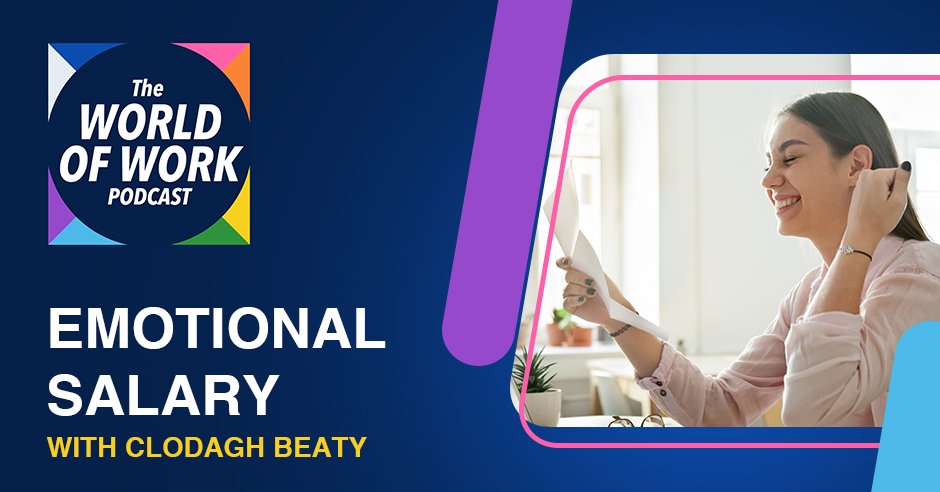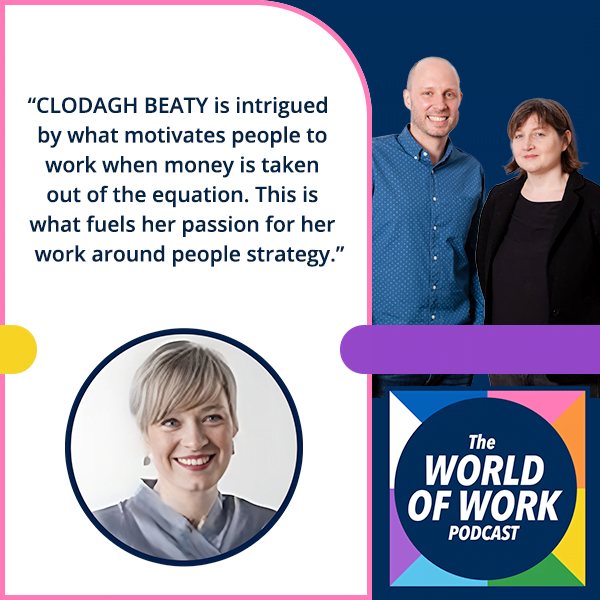
Discover the priceless currency of emotional salary — the intangible rewards that fuel our souls and elevate our work to new heights. Redefine success, find fulfillment, and create a workplace where hearts thrive alongside paychecks. Join us as we sit with Clodagh Beaty, a visionary co-creator of the Emotional Salary Barometer. In this conversation, Clodagh challenges traditional notions of compensation. She delves into the realm of emotional salary — an innovative framework that explores the intangible rewards we receive from our work environment. She uncovers the profound impact of emotional salary on our overall well-being, job satisfaction, and sense of fulfillment. Clodagh also reveals how an enhanced understanding of emotional salary can lead to a more harmonious and rewarding work experience. By embracing the power of emotional salary, we can create a world where work truly becomes a source of inspiration and personal growth. Tune in now and unlock a renewed passion for what you do.
—
Listen to the podcast here
Emotional Salary With Clodagh Beaty
We’ve got another great topic in this episode. We’re going to be exploring an idea or a concept that is talked about as an emotional salary. We’re going to be speaking to Clodagh Beaty, who is one of the co-creators and cofounders of the organization that looks at emotional salary, this framing and idea, which is a different way to think about what we get from our experience from a workplace. Before we jump into that topic and explore it in a bit more detail, Clodagh, could you introduce yourself to the audience and say a little bit about yourself and your background?
Thank you, James, for inviting me. My background is in the HR arena. I spent a number of years working in a range of different HR and learning roles as a generalist HR manager, learning and development manager, and HR project and change management roles as well. I’d previously trained as a coach. I had a strong desire to work for myself.
I left my corporate role. I set up my own coaching, training, and consultancy business, and I moved to Spain. After about seven years of working on my own, I met my now business partner, Marisa Elizundia. She was intrigued by this question, “If you take money out of the equation, why do we work?” That was the start of our journey of working together and our research into emotional salary.
Jane is not here now. She is my cohost on the show. She and I have had similar conversations often about what is it. Certainly, we’re very much motivated by the fact that we know that work can bring us huge amounts of riches that are beyond the payment that we receive. Trying to understand those and give people the opportunity to access that breadth of benefit is something that we think is a good cause to have and something to aspire towards. You speak about emotional salary. Could you say a little bit about what that is in itself? How does that language come about? What is an emotional salary? Tell us a little bit more about that.
Our emotional salary is the non-financial or the emotional gains that we get from our work. Those intangible things make a huge difference to our experience of working and how we feel about our work. They tend to be things that motivate us and lead to greater levels of fulfillment at work. An example would be feeling recognized, valued, and appreciated when we’re at work or being able to have a certain amount of control over the way we do our work or how we manage our time.

In a way, I like to think of emotional salary as a measure of how fulfilled or satisfied we are with the work that we do. That’s not to say financial salary is not important. It’s tremendously important, but we can be very satisfied with our financial salary and still be dissatisfied at work if our emotional salary needs are not being met. In fact, when you start to look at the reasons people give for leaving jobs, many of them are focused around these aspects of emotional salary.
In terms of your desire to focus on this area, did you see a need? Is there a deficit? How do you think the majority of the world would be scoring now on their emotional salary if you were to give them a letter grade? Are they getting an A-plus or are they failing? Where do you think most of the world is?
Most people are probably around a level of average to good. What’s interesting that we discovered during our research is that when people start to develop an awareness of their emotional salary, you get this, “I didn’t realize I had that.” Usually, what happens is when we work with people, and when we use our tool, which measures emotional salary, people often score much higher than they anticipate. The very nature of thinking about these questions, “Do you have opportunities for this at work?” makes them realize that work does give far more than a financial salary. That’s why I’d say that people are around that average to a good level, and that’s not to say that there’s a lot of room for improvement.
I’ve got another question that’s in my mind with things like this. It seems like the concept of emotional salary is related to how we perceive what’s going on and perceive our experience. We’ll go on and look at the emotional salary itself in a little bit more detail. If we are to improve our score in relation to the emotional salary, what do you think the balance is between improving the artifacts of our work and the things that happen in the work? Also, how much do you think is improving our relationship and our perceptions of ourselves when it comes to raising our emotional salary? How much is internal to us and the way we grab life by the smooth handle and how much is based on the reality of a work experience we have?
To a certain extent, that will depend on the individual, but we always talk about it being a three-way process. It is very much about the individual and how much effort and commitment they’re prepared to put into the process, but it also has very much to do with the organization that they find themselves in, like the culture of that organization, the policies, the procedures, and the day-to-day stuff, but also their manager or leader. Also, the interactions they have with them on a daily basis. How much support that leader is giving them in terms of the work that they do and their opportunity to progress at work?
If we think about people who score higher, what kind of impact? If I, as an individual, with self-reported low levels across the different measurements that go into emotional salary, what would that mean for me in terms of my contribution to the workplace? Also, what would it mean to me in terms of my person? Does it correlate with other factors that we should think about?
When you’ve got a low emotional salary, you are going to be disengaged and demotivated at work. You’re probably going to have a negative attitude to your work and potentially to the people you come in contact with at work. No man is an island. That’s going to have an impact on everybody you come into contact with. Also, we spend so much time at work.

Emotional Salary: When you have a low emotional salary, you are going to be disengaged and demotivated at work.
If we think about all of our waking hours, the majority of them are spent at work. If we are feeling disengaged, demotivated, and dissatisfied for a large part of our working hours, that is going to translate into having a negative impact on our life outside of work as well. It’s not always as easy to separate the two things. You don’t walk out of the door at work and suddenly become another person.
That sounds like an ideal state for some people to be able to get that separation but, in reality, we are one being and there’s a balancing of the both of us in the work self and the home self. I like that reference you make there about the contagion of who we are as well. The way we carry ourselves in the emotional framing that we have at any moment can seep out and shape the experiences of those around us.
Something that we talk about sometimes is that if we help somebody improve the experience that they have at work, get up to this higher level of emotional salary that you speak about, and get that benefit of fulfillment and the sub-characteristics that we’ll speak to, people often have not just that better contribution in the workplace, but they tend to go home as more fulfilled people. They go into their communities as more fulfilled people.
They have those crossover and spill-over effects that help shape a little bit more of a positive outcome in the world around them. It feels like a lovely fulcrum point to focus on this. Why don’t we jump a little bit more into the detail of emotional salary itself? Would you be able to talk through what you think some of these factors are and what some of the things are that you look for and measure?
When we started our research, we looked at the existing research that was out there in relation to what motivates people at work, what engages people at work, and what kind of things make a difference in that sphere. We looked at that. We then did some focus groups with individuals to explore with them. Let’s forget about money.
If we forget about money, what is it that’s important for you at work? What is it that makes a difference? That’s how we came up with this framework of ten different elements or factors. None of them are particularly new. Everybody will recognize seeing them before, but nobody has put them together into a framework like this before.
The first one is autonomy. Autonomy is about having the freedom to manage your working style, your projects, and your time. It’s about feeling respected and trusted at work. Also, being able to get on with things. When that doesn’t happen, people tend to be micromanaged. That can have a very negative impact on how people feel about their work.
The next one is having a sense of belonging. This is interesting because it’s about our sense of connection with the organization and with our team, but it’s also about feeling acknowledged at work. It’s feeling seen, appreciated, and valued. There’s also an element of having pride in belonging to a team or an organization.
It’s a fundamental human need to feel that you belong and are valued. I wouldn’t say that any one of the factors that are necessarily more important than the others because it differs depending on the individual, but for me, belonging is something that to me personally is very important. Also, for a lot of people, it has a fundamental impact.
The next one is creativity. This isn’t about having a creative job like working in marketing or being able to be creative at work, but this is about being able to explore and develop your own original ideas. You can be an accountant and be creative. It could be about processes, systems, and different ways of doing things. The next one is direction, and this is in relation to our career. It’s about having that opportunity to see and contribute to a career path, being able to co-create a fulfilling career path.
The next one is enjoyment. This is, to a certain extent, about social interactions at work and having authentic social interactions, but it’s also about having fun as well and having the opportunity to enjoy what you do and enjoy those little breaks during the working day to engage with other people that you’re working with.
The next one is an inspiration. This is one of the lesser-known factors and one that not many people have spoken about before. This is interesting because it’s about having an alignment with your values, but using that to generate this sense of possibility and gaining new insights. It’s about being able to see possibilities and being inspired to see how much you can do. It’s strongly correlated with this feeling of hope and a sense of hope.

Emotional Salary: Inspiration is about having an alignment with your values, but really using that to generate this sense of possibility and gain new insights.
The next one is mastery. Dan Pink has done a lot of work on mastery and how important it is for motivation. This is basically about working towards achieving excellence. It’s getting a deeper understanding and, over time, excelling at what you do. It’s not about perfection, but it is about the satisfaction you get from a job well done.
For me, it’s about being in flow as well. Often, when we work towards mastery, we are very much in flow. We can lose ourselves in the work that we’re doing. The next one is personal growth. This is having the opportunity to gain self-awareness and be a better human being. It’s learning from your mistakes, becoming more reflective, becoming a better person, and having the opportunity to do that through your work.
The next one is professional growth. Again, it’s in relation to developing yourself, but specifically about the skills and abilities that you need to do your work. It’s not only about training. Professional growth is not about official training courses. It’s about getting exposure to stimulating work and to other people and learning from other people. It’s a peer-to-peer exchange, mentoring, and supervision. It’s this element of being able to learn from our mistakes as well. The final factor is purpose. It is feeling that you are contributing to something bigger, to something greater, having a sense of ownership, and significance from the work that you do, and being able to see how important that is for other people.
That’s a lovely list. It spans a big range of different factors that affect our experience in the workplace from aspects of personal to the aspects of our freedom and autonomy. When you work with people and when you do assessments, do you find that there is a consistency of reporting across these? Do you find that very largely? If somebody scored highly in one, would you say that it correlated with scoring highly in any of the others, or does it bounce all around depending on their circumstances?
It can bounce, but there are certain correlations. For example, I don’t think it will be surprising that enjoyment and belonging tend to correlate. For example, we’ve done an audit where they didn’t. There was a gap between belonging and enjoyment. What we were able to establish was that gap was there because people had great relationships and had fun at work, but what was missing was that sense of being valued and appreciated by the organization.
Other ones that tend to correlate, we’ve got three that sit quite strongly in that professional development sphere, mastery, professional growth, and direction, which is very much focused on your career and developing those skills that make you better at your job. It is those technical skills sometimes, and those in relation to your career. They tend to correlate.
What’s interesting is direction is often low. In a lot of the organizations we work with, that tends to be in the bottom three because people don’t feel that there is scope to have a clear career path. It’s not surprising because when we look at the statistics of why people leave jobs, it’s often that lack of career progression that makes people move on. That’s very much in line with what we see there.
When we look at the statistics of why people leave jobs, it’s often that lack of career progression that makes people move on.
Do you find that different people plays different levels of importance on these different factors? Do some of them stand out for everybody? Do some vary by person? What’s your take?
When people complete the Emotional Salary Barometer, which is our tool, which measures emotional salary, as well as asking them questions about these ten factors, we ask how important they are to them. For most people, all of them are relatively important, but the importance depends on the individual. It’s very much about what’s important for you, but also the stage of life that you are at.
For example, somebody who’s got caring responsibilities may not be as focused on direction and focusing on moving their career forward because, at that stage in their life, they may be looking after a relative and don’t have the time to dedicate to moving their career forward. For them, enjoyment might be more important because it’s about getting that release when they go to work. It depends on the individual but also the stage of life that they’re at as well.
Do you find that there’s a hygiene threshold to any of these? If we were to say wonderful on 90% of them and one of them was at 10%, would that sway everything down materially, or would we gloss over that and say, “We’re averaging 87%,” or whatever it would be?
In terms of an overall score, it would be taken into account, but it would be very clear from the reports that it was something that would be flagged up as an action point. Generally, it’s unusual for that to happen, but it can happen when there’s one factor that is very low. It’s relatively easy to identify what’s causing it.
As you said, you went through a process of reading, research, and focus groups to come up with this. Were there any other things that you jettisoned, or are there any other factors that you thought of around the edges that you thought could have been interesting to have in here but then decided that it’s not a priority?
There were. We were thinking about having a factor of co-creation, but when we explored it a little bit further, we felt that co-creation is a theme that runs through all of these. Coming back to what I said about this three-way responsibility, the individual, the leader, and the organization, it’s about those three parties working together to co-create a working environment where people can thrive and they can increase their emotional salary.

Emotional Salary: This three-way responsibility is about the individual, the leader, and the organization working together to co-create a working environment where people can thrive, and they can increase their emotional salary.
Another factor that we consistently get asked about is security. People say, “Security is so important. Job security has a fundamental impact on how we feel about our work.” We didn’t include it because we feel there are elements of it in relation to some of these factors. Also, we feel that these factors, to a certain extent, taking into account the environment that people are in, there are things that you can do to increase these factors.
When it comes to job security, you can’t. There’s nothing that you can do that can increase your job security. We wanted to focus on things where we felt that people could make an impact themselves. Regardless of the work environment they were in, there are still some things they could do to improve their emotional salary. With security, you have no control over whether or not a company is going to go into liquidation next week or not.
It’s beyond changing your career or changing your role, but it’s anchored to that role that’s outside of your own set of control. I’d like to hear a little bit more from you on the inspiration one. A lot of the others are things that we’re aware of and can come across in some of the other areas. You referenced Dan Pink and there are other places where these are a little bit more prominent potentially.
With inspiration, you talked about things like values alignment, possibility, and hope. You talked in words that made me think a little bit about the domain of positive psychology and things like psychological capital and those framings of that positive set of emotions. Could you expand on that a little bit more, talk about that, and how that affects us maybe?
Positive psychology was one of our guiding principles when we started this piece of research. Inspiration is important because our values have such an impact on how we perceive the world. If we can align our values with our work, then it makes us feel like anything is possible. It does encourage us to do our best possible work because it feels seamless. We feel hopeful. We see possibilities both in ourselves and in others.
We’re able to connect with other people and be inspired by other people. Not only that but to inspire others ourselves. I saw a quote. It’s a quote I’ve seen before. It was something along the lines of, “You don’t have to have a title to be a leader.” It’s very much about that. It’s very much about being able to do the best you can do and be the best you can possibly be because of that alignment and this belief and hope for the future.
One of the quotes I happen to have on my desktop on the value space I like was from Michelle Obama who talked at one of American universities. She said, “I have learned that as long as I hold fast to my beliefs and values and follow my moral compass, then the only expectations I need to live up to are my own.” There’s something liberating and freeing within that positivity of defining our constraints around what good looks like that can lead into that space.
In the creativity space, you talked about creativity and enjoyment. One of the things that are a bit of a bugbear of mine is I believe there’s a bit of a preconception that a lot of work needs to be difficult, arduous, or unpleasant, otherwise, it ceases to be work. If it’s fun, it’s not work. That goes against some of the strengths-based and more positive approaches to work. Could you elaborate on that a little bit more and tell me a little bit more about the role of creativity and enjoyment? Also, what your views are on whether that is permissible in work? How does that equate to work? How does playfulness work or not?
The first thing I’d say is this is one of the reasons why we created and worked on this framework. It’s because there is this preconceived idea that work should be painful and that work is an exchange of work for money. It’s a necessary evil and we have to do it to survive, but as we’ve already said, work gives us so much more.
There is this preconceived idea that work should be painful, that work is just an exchange of work for money, that it’s a necessary evil, and we have to do it to survive. But actually, work gives us so much more.
There’s so much research that demonstrates that when people are having fun, when people are relaxed, and when people have the opportunity to express their original ideas and do things to step out of the norm, their creativity and innovation increase. It has a positive impact in terms of motivation and productivity. For me, we need to be harnessing that and creating spaces for people to be more creative and have more fun at work. It’s so important.
It’s liberating. You talked about flow. Probably there’s a bit of an overlap between enjoying what we do and being in a state of flow. It’s that optimal performance space that brings some of that together into an enriching experience for us, productive benefits for those around us, social contagion of positive emotions, and all those lovely things. What do we do with this? If we go out there, if we have one of these audits, if we get a score, if we do it and score ourselves and we get a ten result back across these different factors, how does that help me? What do I do once I’ve got that information?
As an individual, when you develop an awareness of your emotional salary and what’s important to you, it enables you to do several different things. Firstly, it enables you to have the conversations that you might need to have. One of the things that were important for us in creating this was that it was a framework that individuals and leaders could use to have open and honest conversations about what people need and want from work.
In our experience, that doesn’t happen, and that was one of the driving forces behind creating this. It was making it easier for people to have these conversations. One, it enables you to have some open and honest conversations about what’s important to you. That also helps you to recognize perhaps in the longer term what you want from your career. Do you want to move in a certain direction?
That could inform what kind of projects you decide you want to work on or what type of companies you might decide that you want to work in during your career. Also, it could be about setting yourself some personal goals to inspire other people more or thinking about how you can align your work with your purpose. It could be about getting more fulfillment on a personal level.
As we said, work takes up such a huge amount of time in our lives that if we’re miserable at work, we’re probably going to be miserable for some of the time we’re outside of work. Gaining an awareness of our emotional salary empowers us to take responsibility and make decisions to improve our emotional salary and to gain more fulfillment. Yes, that’s going to have a positive impact on our work life, but that’s going to have a positive impact on our life outside of work as well.
A lot of people are miserable at work, aren’t they? It’s been a case for a while that engagement is not high. In terms of the practicalities of what I could do, let’s say I get an audit of my emotional salary. I’ve got that information. I go to my boss. I could say, “Let’s have a chat about this. I’ve done some reflection and thinking. These are the things. I think this is interesting.” What do you see as the next stage of being? Do you see it moving towards changing careers? Do you see it looking towards a job crafting conversation with your manager? Do you see it as changing internally? What do you see that next potential pathway be?
To be honest, it depends on the environment that you’re working in. In an ideal world, what I would see would be a job crafting conversation would be sitting down with your manager to say, “I’ve done this, and it’s made me realize that I’d like some exposure to these types of projects. Is that something that we can put a plan into place to do in the future?” The ideal would be to have those conversations, which lead to some changes at work that mean you are going to be more fulfilled and you’re working towards your career goals.
However, that depends on your leader. It depends on their knowledge of emotional salary. It depends on the constraints that they have on them from the organization. Sometimes, we’ve seen it. You can have a brilliant boss who’s 100% behind you, but the organizational policies and procedures don’t allow them to have that job-crafting conversation. That’s what it comes back to. Those three kinds of elements that are responsible for this are the individual, the leader, and the organization.
Sometimes, you can have a brilliant boss who’s a hundred percent behind you. But the organizational policies and procedures don’t allow them to have that job crafting conversation.
We spoke about work and life being blended. We don’t put on a different set of clubs, come out of a phone box, and be a different person at the end of the day when we transition across. When we’re looking at the emotional salary aspects of things we take from a workplace, if we have deficits in our workplace, is there scope to bring these aspects into the forefront of our outside-of-work life to give us a little bit of enrichment in that sphere as well? For example, if mastery is something that I feel I’m lacking in the workplace, were I to take up an instrument and join a symphony and progress in that? Would that help alleviate some of that deficit, would you say? How do the work and non-work life blend across this?
It depends on how important your work is to you. You can find mastery in other areas of life and you can express your creativity in other areas of life, but if your mastery and creativity are being constrained at work, just because you can get it somewhere else outside of work, it’s not going to make you more fulfilled at work. With mastery, what can happen is we are not allowed the time we need to deliver excellent work.
We’re seeing that more and more often nowadays. Companies are putting more and more pressure on people to produce quickly. That leads to feelings of stress, overwhelm, and feeling like you’re never doing good enough work because you’re not given the time that you want to produce excellent work. You could go out and learn guitar and practice your mastery outside of work, but that’s not going to change the fact that inside work, your mastery is being constrained.
Setting aside the constraints that a leader might have imposed on them. It means that they couldn’t enter into a job crafting conversation. Assuming that they had some autonomy for themselves in that space, how would somebody go about setting out a business case for them to have job crafting around these? If somebody was to go up to their leader and if a leader were in a position to do this, what would you say the benefits are for your organization of somebody having this? How would you do that little sales pitch?
There are very clear correlations between these factors and motivation. These are the things that motivate people at work. These are the things that lead to higher levels of employee engagement. These are things that lead to better performance. All of those benefits that you get from that are going to translate into benefits for the company. We’re not talking about increased productivity. Nowadays, we’re also talking about reputation.
We’ve seen numerous examples in the press over the last few months about how companies who are treating their employees badly about how that is impacting how their customers feel about them or how their clients feel about them. There are all of those productivity benefits and the financial benefits that run from that, but there’s also that reputational benefit as well.
There’s a clear business case around it for leaders and organizations to step into this as well. As you were speaking, I had another reflection and something I wanted to touch on. Quite often as humans, we acclimatize or attenuate different circumstances and situations that we’re in. We’ll have a boost as a result of a change, and then we’ll go back to our trend line in terms of self-reporting on things.
It’s the good old hedonic adaptation. You’ve got a good summary of it on your website.
In terms of that, do you think we adapt across these different factors? What’s your sense? Is this something that needs to be a live project that we’re always evolving in and moving in, or is there a fixed point?
It does have to be something that we are continuously aware of for exactly the reasons that you said. That was one of the psychological principles that informed our research. This fact is that we do return to this baseline level of satisfaction after a while. We need to gain awareness of our emotional salary, and we need to maintain awareness. Every now and then, sit down and think about, “How are things going? Am I happy with what’s happening at work? Which of these elements am I still lacking? What can I do to get more of this?”

Emotional Salary: We need to gain awareness of our emotional salary.
That constant attention can help us be masters of our careers and our experiences and have these different aspects, which is great.
It very much reminds me of gratitude, having a gratitude practice. If you sit down on a regular basis and write down what you’re grateful for, that’s going to have a much more positive impact. You’re going to feel more grateful. It’s the same with this. If every now and then, you sit down, you think about, “What is my emotional salary? How would I score it now?”
You’ve got to recognize it’s going to go up and down. Anything that happens at work could impact your emotional salary. A colleague that you’re close with might leave, and that’s going to have a massive impact. Your boss could change. It’s a massive impact. The systems that you use at work, policies, and procedures, all of those things can have an impact on your emotional salary. It’s not something that is static. It’s fluid and constantly changing.
I’ve got one more focus question before we check out. This is a useful tool. There’s some wonderful stuff in here, and it gives us a real way to visualize and give language to some of the things we experience at work that shape our experience, our level of fulfillment, and our productivity, performance, or whatever other words we want to use in that space. What would your ask be for managers as a result of knowing this? If managers are suddenly aware of these different factors and the way that they manifest in their teams, what would your ask be of managers to hold this in mind?
Talk to your team. Fundamentally, develop an awareness and understanding of your own emotional salary. I always say with leaders that it’s a bit like the oxygen mask on a plane. Put your own on before you help somebody else. For a leader, understanding your own emotional salary will help you work with your team in improving their emotional salary. The first step is to understand what it’s all about.
Secondly, talk to your team. Have open conversations with them. One of the things that frustrates me most when I worked in the HR field was people are not having these conversations, and they should be. There’s so much scope for so many people to have a much more positive experience of work if they did have these conversations.
It’s because a lot of these things are not about big things. They’re about small things. They’re not about things that cost a lot of money. They’re about the simple things. They’re about telling your colleagues or your team that you appreciate them and value them. They’re about asking for people’s input on a change of process or procedure. They’re not massive things. These are small things that we can all do to make a huge difference.
That’s a lovely call to action. Thank you for that. In the interest of time, I’m going to wrap us up and draw the conversation to a close. Before we go, how could people find out more about you and find out more about the emotional salary or even explore one of the audits or self-assessments?
I’m always happy for people to connect with me on LinkedIn. Please happily connect with me. LinkedIn is a good place because that’s where we share tips, ideas, and infographics. It’s where we are trying to raise awareness about emotional salary.
Connect with me on a personal level or link to our company page, which is the Emotional Salary Barometer. Also, have a look at our website, which is Emotional-Salary.com. They’re probably the easiest ways, but I’m always open to answering questions or having conversations about me because it’s something that I’m very passionate about.
Thank you so much for your time. It’s been a great conversation.
Thank you, James, for making it such an easy process.
—
Thanks for reading. Don’t forget. As well as this show, we deliver at least one free online seminar every month that everyone can attend. You can sign up for this and our newsletter on our website, www.WorldOfWork.io.






